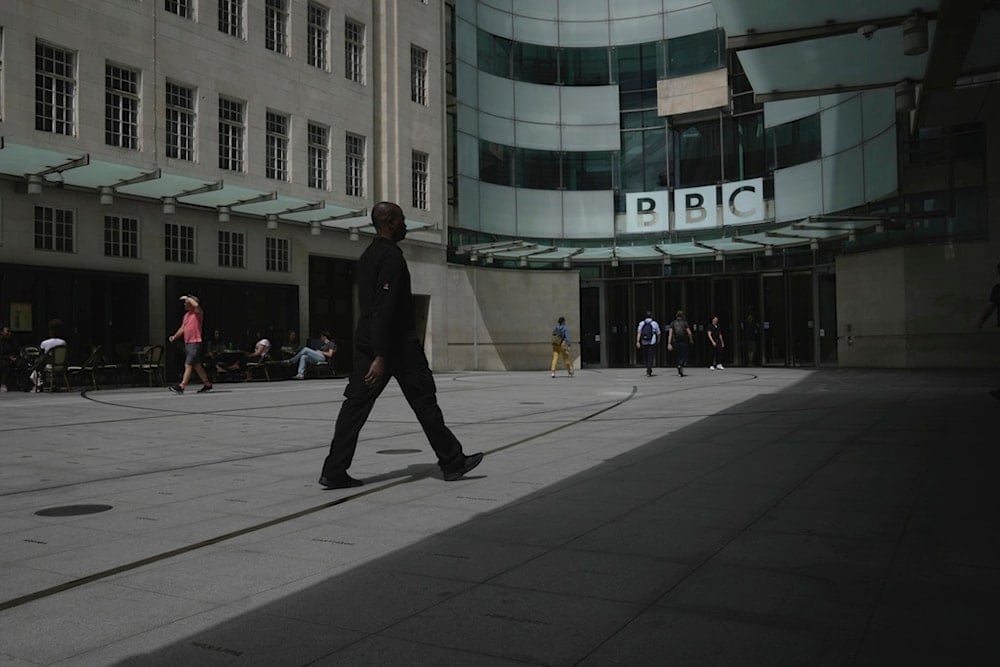Declassified lays bare pro-'Israel' bias in UK newsrooms
In interviews for Declassified, several current and former staff members from the BBC, Sky, ITN, The Guardian, and The Times revealed a consistent pattern of anti-Palestinian bias within their newsrooms.
-

People walk outside the BBC Headquarters in London, Britain, Tuesday, July 11, 2023. (AP)
Journalists from some of the UK's most famous publications and television stations have expressed concerns about pro-"Israel" bias in their companies.
Speaking exclusively to Declassified, several current and former staff members from the BBC, Sky, ITN, The Guardian, and The Times revealed the extent of anti-Palestinian bias within their newsrooms.
With a range of political leanings, all journalists, who requested anonymity for fears of professional retaliation, painted a consistent picture despite the obstacles faced by reporters trying to humanize Palestinians or scrutinize Israeli government narratives.
A reporter from the right-wing Times newspaper recalled "crying in the bathroom" numerous times due to the struggle of attempting to report properly, while staff at The Guardian reported an "exhaustive spreadsheet" with a "mountain of examples" of the paper "amplifying unchallenged Israeli propaganda… or treating clearly false statements by Israeli spokespeople as credible."
Journalists working in television studios confront a similar challenge, with immediate consequences if Israeli officials are asked uncomfortable questions.
Across all major media outlets where Declassified acquired access to insiders, a constant theme was the difficulty of reporting on "Israel's" war crimes, even though they were captured on tape.
Israeli narrative 'reigns supreme'
One Sky News journalist recalled unwritten journalistic norms that only apply to "Israel", detailing how it was a constant battle to report the truth.
"We would see the raw footage being sent to us from Gaza – we’re all well aware of the carnage. Yet you can’t describe what your eyes are seeing."
During the Israeli war on Gaza, Sky News was chastised on social media for failing to assign culpability when Palestinians were murdered, in contrast to vivid, humanizing reportage on Israeli deaths.
One journalist told Declassified they were "frequently frustrated" at how nothing could be reported without direct confirmation from the Israeli occupation's military.
"We never wait for the Russians; we take Ukrainian claims at face value as the victims. Why is this any different?"
The source recalled how Israeli claims were never contested, and any caution to staff members regarding Israeli lies fell unheard as the Israeli narrative always "reigned supreme" despite its inaccuracy.
The Sky News journalist went on to say that speaking out and attempting to change the course of coverage has consequences, often earning someone labels of being "difficult or rigid."
There are comparable worries at ITN, which produces news programs for ITV, Channel 4, and Channel 5. A journalist employed by ITN, who preferred not to reveal the specific programming on which they worked, underlined the callous approach to reporting on Palestine.
One worker commented that the emphasis is on "clicks not ethical clarity," with tragic footage of Gaza being met with enthusiasm for how much traffic it may generate for the outlet.
The source expressed how working in such a climate where colleagues seem "detached – or even excited – about these tragedies is incredibly difficult."
BBC bias
Two former BBC journalists told Declassified that the Sky and ITN playbooks were all too familiar, with one describing that after October 7, the systematic prejudice was evident, with the BBC openly "dehumanizing Palestinians across TV, radio, and online output."
One recalled a clear hierarchy of human life in the coverage, with "a deliberate focus on Israelis who lost their lives and hostages, with reporters naming them and developing narratives about them which were very sympathetic and humanizing, yet there was no such treatment for Palestinians."
That journalist described how senior staff's unwritten norms fostered a culture of censorship, saying, "The use of the word genocide is effectively banned, and any contributor who uses this word is immediately shut down."
Away from television, comparable patterns of systematic prejudice may be detected in the British press, at both liberal and conservative publications. A journalist from the right-wing Times daily recalls how language was constantly used to mold understanding. "In all my reports, phrases like ‘since October 2023’ were changed and edited to ‘since the Hamas attacks’."
"I wanted to be dispatched to the Middle East to do some stories that center Palestinians, having had some prior experience doing so. But I was denied, with ‘budgetary constraints’ cited as the reason. I later found out that a reporter who ordinarily covered Ukraine had instead been sent, despite having little experience in the region. They knew I didn’t attend the IDF briefings or regurgitate Israeli talking points like the other Times reporters, so instead let someone else go who would publish all the ‘right things’."
Guardian amplifies Israeli propaganda
This practice of restriction and diluting coverage does not appear to be limited to right-wing publications. A journalist from the left-leaning The Guardian, speaking anonymously to Declassified, described the difficulties in covering "Israel's" attack on Gaza.
"An exhaustive spreadsheet has been created by staff from the collective US and UK team to document egregious reporting from The Guardian and an internal network of staff was set up in October 2023 to coordinate any dissent," they said.
One big point of concern that kept coming up in text, the writer pointed out, was the newspaper's use of the phrase "Hamas-run health ministry" when discussing the death toll in Gaza.
"There is no reason for The Guardian to be using language tools that downplay the death toll, especially when credible sources exist that suggest the death toll is higher than reported."

 5 Min Read
5 Min Read








